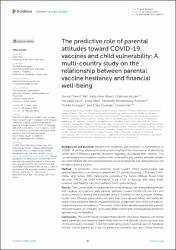| dc.contributor.author | Sharif Nia, Hamid | |
| dc.contributor.author | Allen, Kelly-Ann | |
| dc.contributor.author | Arslan, Gökmen | |
| dc.contributor.author | Kaur, Harpaljit | |
| dc.contributor.author | She, Long | |
| dc.contributor.author | Khoshnavay Fomani, Fatemeh | |
| dc.contributor.author | Görgülü, Özkan | |
| dc.contributor.author | Sivarajan Froelicher, Erika | |
| dc.date.accessioned | 2023-03-24T12:29:52Z | |
| dc.date.available | 2023-03-24T12:29:52Z | |
| dc.date.issued | 2023 | en_US |
| dc.identifier.citation | Nia, H. S., Allen, K. A., Arslan, G., Kaur, H., She, L., Fomani, F. K., ... & Froelicher, E. S. (2023). The predictive role of parental attitudes toward COVID-19 vaccines and child vulnerability: A multi-country study on the relationship between parental vaccine hesitancy and financial well-being. Frontiers in Public Health, 11. | en_US |
| dc.identifier.issn | 22962565 | |
| dc.identifier.uri | https://doi.org/10.3389/fpubh.2023.1085197 | |
| dc.identifier.uri | https://hdl.handle.net/20.500.12513/4998 | |
| dc.description.abstract | Background and purpose: Recent new mutations and increases in transmission of COVID-19 among adolescents and children highlight the importance of identifying which factors influence parental decisions regarding vaccinating their children. The current study aims to explore whether child vulnerability and parents' attitudes toward vaccines mediate the association between perceived financial well-being and vaccine hesitancy among parents. Method: A predictive, cross-sectional, multi-country online questionnaire was administered with a convenience sample of 6,073 parents (Australia, 2,734; Iran, 2,447; China, 523; Turkey, 369). Participants completed the Parent Attitude About Child Vaccines (PACV), the Child Vulnerability Scale (CVS), a Financial Well-being (FWB) measure, and Parental Vaccine Hesitancy (PVH) questionnaire. Results: The current study revealed that perceived financial well-being had significant and negative associations with parents' attitudes toward COVID-19 vaccines and child vulnerability among the Australian sample. Contrary to the Australian findings, results from Chinese participants indicated that financial well-being had significant and positive predictive effects on parent attitudes toward vaccines, child vulnerability, and parental vaccine hesitancy. The results of the Iranian sample revealed that parents' attitudes toward vaccines and child vulnerability significantly and negatively predicted parental vaccine hesitancy. Conclusion: The current study revealed that a parents' perceived financial well-being had a significant and negative relationship with parental attitudes about vaccines and child vulnerability; however, it did not significantly predict parental vaccine hesitancy among Turkish parents as it did for parents in Australia, Iran, and China. Findings of the study have policy implications for how certain countries may tailor their vaccine-related health messages to parents with low financial wellbeing and parents with vulnerable children. Copyright © 2023 Sharif Nia, Allen, Arslan, Kaur, She, Khoshnavay Fomani, Gorgulu and Sivarajan Froelicher. | en_US |
| dc.language.iso | eng | en_US |
| dc.publisher | Frontiers Media S.A. | en_US |
| dc.relation.isversionof | 10.3389/fpubh.2023.1085197 | en_US |
| dc.rights | info:eu-repo/semantics/openAccess | en_US |
| dc.subject | child vulnerability | en_US |
| dc.subject | financial well-being | en_US |
| dc.subject | mediation study | en_US |
| dc.subject | parental attitudes toward COVID-19 vaccines | en_US |
| dc.subject | parental vaccine hesitancy | en_US |
| dc.title | The predictive role of parental attitudes toward COVID-19 vaccines and child vulnerability: A multi-country study on the relationship between parental vaccine hesitancy and financial well-being | en_US |
| dc.type | article | en_US |
| dc.relation.journal | Frontiers in Public Health | en_US |
| dc.contributor.department | Tıp Fakültesi | en_US |
| dc.contributor.authorID | Özkan Görgülü / 0000-0002-6802-4450 | en_US |
| dc.identifier.volume | 11 | en_US |
| dc.identifier.startpage | 1 | en_US |
| dc.identifier.endpage | 14 | en_US |
| dc.relation.publicationcategory | Makale - Uluslararası Hakemli Dergi - Kurum Öğretim Elemanı | en_US |


















